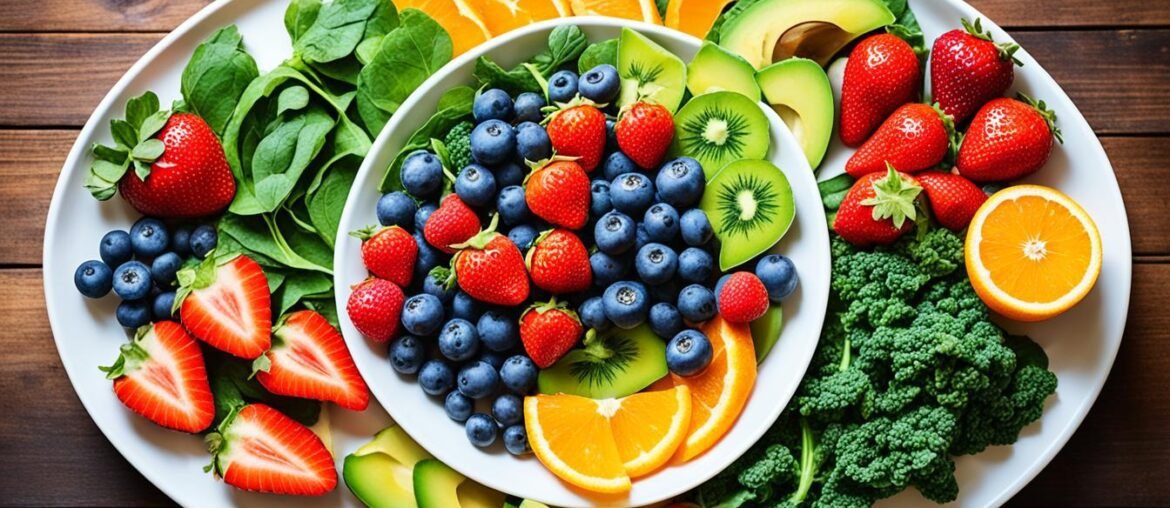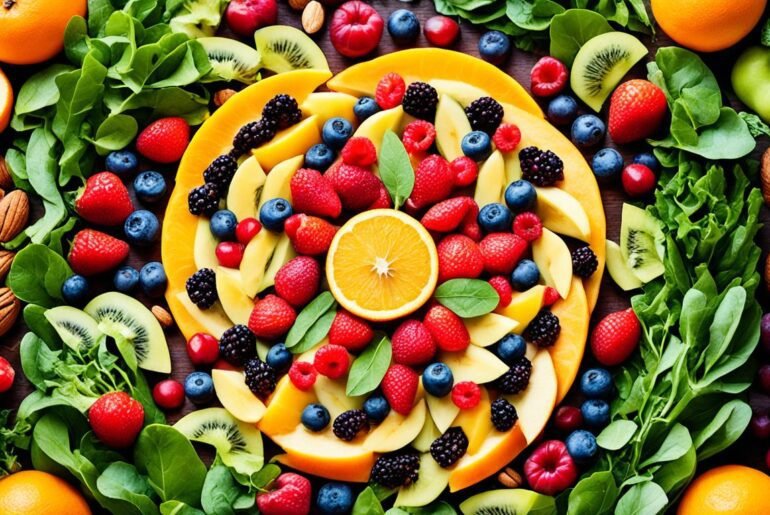Did you know that your skin, the largest organ in your body, is constantly exposed to environmental factors that can damage its health and appearance? While skincare products play a role in maintaining radiant skin, the foundation for a glowing complexion starts from within. A well-rounded, healthy diet is essential for nourishing your skin and achieving that coveted glow.
Whether you want to improve your skin’s elasticity, slow down the aging process, or simply enhance your natural radiance, incorporating the right foods into your diet can make a significant difference. From fruits and vegetables rich in vitamins and antioxidants to probiotic-packed fermented foods, there are various dietary choices you can make to support your skin health.
Key Takeaways:
- Include nutrient-rich foods like strawberries, kimchi, sunflower seeds, organ meats, shellfish, and broccoli in your diet to promote healthy and glowing skin.
- Focus on consuming foods high in vitamins A, C, and E, selenium, zinc, omega-3 fats, and collagen-boosting nutrients.
- Remember to stay hydrated and maintain a balanced diet for optimal skin health.
- Aim for a variety of colorful fruits and vegetables to ensure you’re getting a diverse range of skin-boosting nutrients.
- Consult with a healthcare professional or registered dietitian for personalized advice on optimizing your diet for skin health.
The Power of Vitamin C in Strawberries
When it comes to promoting skin health, strawberries are a delicious and nutritious option. These juicy red berries are packed with essential nutrients that can enhance the appearance and well-being of your skin.
One of the key players in strawberries’ skin benefits is vitamin C. This powerful antioxidant plays a vital role in protecting skin cells from oxidative damage caused by factors like pollution and UV rays. By neutralizing free radicals, vitamin C helps prevent premature aging and promotes a youthful complexion.
Additionally, vitamin C is essential for collagen production, a protein responsible for maintaining skin’s elasticity and firmness. By supporting collagen synthesis, strawberries can help keep your skin smooth, supple, and resilient.
But vitamin C isn’t the only skin-loving nutrient found in strawberries. These vibrant berries also contain anthocyanins, phenolic acids, and flavonoids, all of which have antioxidant properties. These antioxidants further enhance the skin’s defense against free radicals, helping to maintain its health and radiance.
Anthocyanins, the pigments that give strawberries their vibrant red color, have been shown to offer numerous benefits for the skin. Research suggests that anthocyanins can have anti-inflammatory effects, protect against UV damage, and promote collagen synthesis.
Phenolic acids, another group of antioxidants, are thought to exhibit anti-inflammatory and anti-aging properties. These compounds contribute to the overall protection of skin cells and help maintain a youthful appearance.
By incorporating strawberries into your diet, you can take advantage of their skin-boosting benefits. Just one cup of strawberries provides over 100% of the recommended daily value of vitamin C, making them an excellent choice for nourishing your skin from the inside out.
“Strawberries are not just a delicious treat; they are a powerhouse of skin-loving nutrients that can enhance your complexion and protect your skin from damage.” – Dr. Emily Thompson, Dermatologist
| Nutrient | Amount per 1 cup (144g) |
|---|---|
| Vitamin C | More than 100% of the daily value |
| Anthocyanins | ~229 mg |
| Phenolic Acids | ~185 mg |
As seen in the table above, strawberries are jam-packed with skin-boosting nutrients. From vitamin C to anthocyanins and phenolic acids, these berries offer a multitude of benefits for your skin’s health and appearance. So, why not indulge in some strawberries today and let your skin glow from within?
Nourish Your Gut with Kimchi
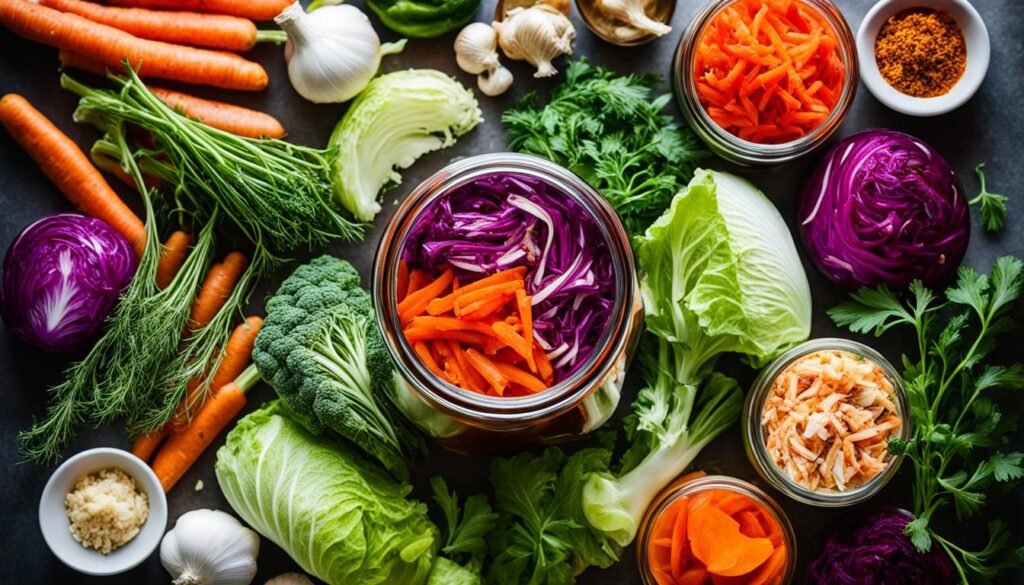
The health of your gut is closely linked to the health of your skin. Consuming foods rich in beneficial bacteria, such as probiotics, and fiber can support both gut and skin health. Kimchi, a type of fermented dish, is a great source of probiotics and nutrients like provitamin A and vitamin C. Including kimchi in your diet can help promote a healthy gut and improve your skin’s appearance.
Probiotics are live bacteria and yeasts that are good for your overall health, especially your digestive system. They can be found in various fermented foods, and kimchi is one of the best sources of probiotics.
Research suggests that probiotics can benefit not only your gut but also your skin health. Probiotics help balance the bacteria in your gut, which in turn can improve the integrity of your gut barrier. A healthy gut barrier prevents harmful substances from entering your bloodstream and causing inflammation, which can negatively impact your skin.
By incorporating probiotics into your diet through foods like kimchi, you can enhance your gut health and potentially improve conditions like acne, eczema, and rosacea. Probiotics may also help reduce skin dryness and promote a youthful appearance.
In addition to probiotics, kimchi is rich in provitamin A and vitamin C, which are essential for skin health. Provitamin A, also known as beta-carotene, is converted into vitamin A in the body and plays a role in promoting cell turnover and skin regeneration. Vitamin C is a powerful antioxidant that protects the skin from free radicals and helps in collagen production, which is necessary for maintaining skin elasticity and reducing wrinkles.
Including kimchi in your meals can be a flavorful way to support both your gut and skin health. Whether enjoyed as a side dish or added to your favorite recipes, kimchi offers a range of health benefits that extend beyond just your gut. So, don’t be afraid to spice up your meals with this delicious and probiotic-rich food.
The Benefits of Sunflower Seeds
Sunflower seeds offer a myriad of benefits for achieving and maintaining healthy skin. They are a rich source of protein and vitamin E, both of which are vital for nourishing the skin and promoting its overall health and vitality.
Vitamin E is a powerful antioxidant that protects the skin cells from damage caused by free radicals and harmful UV rays. It helps regulate inflammation, which is essential for maintaining a healthy complexion. Additionally, vitamin E plays a crucial role in collagen synthesis, promoting elasticity and reducing the signs of aging.
In addition to vitamin E, sunflower seeds are also packed with other antioxidants that further enhance their skin-nourishing properties. These antioxidants help combat oxidative stress, reduce inflammation, and promote a brighter and more youthful-looking complexion. Sunflower seeds also contain essential minerals like selenium and zinc, which are known for their role in maintaining healthy skin.
Adding sunflower seeds to your daily diet can provide your skin with the necessary nutrients to keep it nourished, protected, and looking radiant. Whether enjoyed as a snack, sprinkled on salads, or incorporated into your favorite recipes, these tiny seeds pack a powerful punch when it comes to skin health.
Nutritional Content of Sunflower Seeds
| Nutrient | Amount per 100g |
|---|---|
| Protein | 19g |
| Fat | 49g |
| Vitamin E | 35.17mg |
| Selenium | 53.0µg |
| Zinc | 5.0mg |
As shown in the table above, sunflower seeds are packed with nutrients that are essential for healthy skin. From their protein content to their high vitamin E levels and valuable minerals like selenium and zinc, these little seeds provide a wide array of benefits for your skin.
The Power of Bone Broth
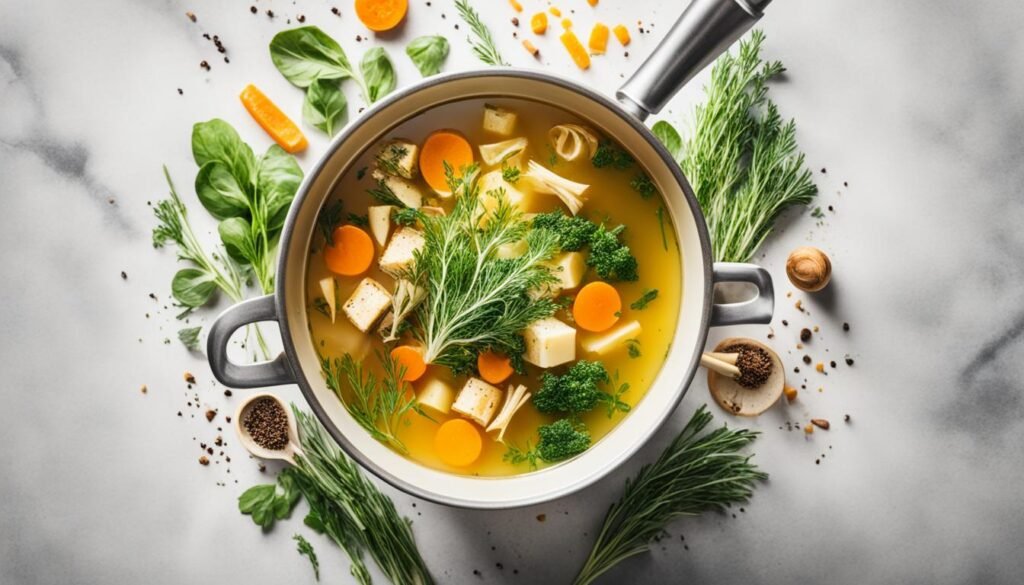
Bone broth is a collagen-rich elixir that can work wonders for your skin health. It contains gelatin, amino acids, and other nutrients that support collagen synthesis and promote the regeneration of skin cells.
Collagen is a vital protein that gives your skin structure and elasticity. As you age, the production of collagen naturally decreases, leading to sagging skin and the formation of wrinkles. Consuming collagen-rich bone broth can help replenish your body’s collagen levels, resulting in firmer and more youthful-looking skin.
Gelatin, a derivative of collagen, is known for its skin-nourishing properties. It helps improve skin elasticity and hydration, giving your skin a plump and healthy appearance. By consuming bone broth regularly, you can provide your skin with the gelatin it needs to support its overall health and vitality.
Additionally, bone broth is packed with amino acids, which are the building blocks of proteins. Amino acids are crucial for the regeneration of skin cells, as they support the repair and growth of new tissues. By supplying your skin with these essential amino acids, bone broth can aid in skin regeneration and improve overall skin texture and tone.
Another benefit of bone broth is its hydrating effect on the skin. Staying properly hydrated is essential for maintaining skin health, as it helps to keep the skin plump, smooth, and radiant. The amino acids and electrolytes present in bone broth contribute to hydration, promoting a healthy and glowing complexion.
Integrating collagen-rich bone broth into your diet can be as simple as sipping a warm cup of broth or using it as a base for soups and stews. By nourishing your skin from within, bone broth can help you achieve a healthy and vibrant complexion.
The Benefits of Bone Broth at a Glance:
- Supports collagen synthesis
- Promotes skin cell regeneration
- Nourishes the skin with amino acids
- Improves skin elasticity and hydration
“Bone broth is nature’s skincare secret, providing the essential nutrients your skin needs to thrive. Drink up for a radiant and youthful complexion!”
The Benefits of Organ Meats
When it comes to promoting skin health, organ meats are highly nutritious and offer a range of benefits. Liver and heart are two examples of organ meats that can do wonders for your skin. Let’s take a closer look at the key nutrients found in organ meats and how they contribute to a glowing complexion.
Copper for Skin Protection
Organ meats, such as beef liver, are rich in copper, a mineral that plays a vital role in maintaining healthy skin. Copper acts as an antioxidant, protecting the skin cells from free radical damage caused by environmental factors like pollution and UV radiation. Additionally, copper is involved in collagen production, which helps keep the skin firm and elastic.
Selenium and Zinc in Organ Meats
Incorporating organ meats into your diet is an excellent way to boost your intake of selenium and zinc, two essential minerals for skin health.
Selenium is a powerful antioxidant that helps protect the skin from oxidative stress. It can also help reduce inflammation, which can contribute to various skin conditions. Organ meats, such as liver, contain significant amounts of selenium, making them an excellent source of this essential mineral.
Zinc is another vital mineral for skin health. It supports the immune system and helps maintain the integrity of the skin barrier. Adequate zinc levels can also promote collagen production and speed up wound healing. Organ meats, such as heart, provide a good amount of zinc, adding to their skin-boosting benefits.
Nutrient Density of Organ Meats
Organ meats are incredibly nutrient-dense, meaning they contain a wide range of essential vitamins and minerals in high concentrations. In addition to copper, selenium, and zinc, organ meats like liver and heart are packed with other nutrients that support overall health and have positive effects on the skin.
For instance, organ meats are excellent sources of vitamin A, which is crucial for skin cell turnover and the production of sebum, the skin’s natural oil. They also provide various B vitamins, including B12 and folate, which play essential roles in skin health and overall well-being.
Incorporating organ meats into your diet can provide your skin with the nutrients it needs to stay glowing and healthy. To enjoy the benefits, try adding liver, heart, or other organ meats to your favorite recipes, or explore traditional dishes that feature these nutrient-rich ingredients. Remember to source your organ meats from reputable sources to ensure their quality and freshness.
Shellfish for Skin Glow

When it comes to achieving a glowing complexion, shellfish is a hidden gem. Oysters, clams, and mussels, in particular, are rich in nutrients that support skin health. These delicious seafood options are packed with minerals like zinc, selenium, and copper, which have antioxidant and anti-inflammatory properties.
Zinc is essential for collagen production, helping to maintain skin elasticity and repair damaged tissues. Selenium, on the other hand, acts as a powerful antioxidant, protecting the skin from oxidative stress and helping to maintain a youthful appearance. Copper plays a crucial role in the synthesis of collagen and elastin.
In addition to these important minerals, shellfish also provide omega-3 fats, which have anti-inflammatory effects. Omega-3 fatty acids are essential for maintaining healthy skin function and reducing inflammation, which can contribute to skin conditions such as acne and psoriasis.
By incorporating shellfish into your diet, you can nourish your skin from the inside out and promote a healthy, glowing complexion. Whether enjoyed raw, steamed, or in a delicious seafood dish, shellfish can be a valuable addition to your skin-friendly diet.
“Shellfish, with their rich mineral content and omega-3 fats, can help improve skin appearance and promote a healthy, glowing complexion.” – Dr. Jessica Carter, Dermatologist
Zinc and Selenium Content in Shellfish:
| Shellfish | Zinc (mg per 100g) | Selenium (mcg per 100g) |
|---|---|---|
| Oysters | 18.0 | 59.0 |
| Clams | 4.3 | 45.0 |
| Mussels | 2.7 | 47.0 |
Table: Zinc and selenium content in different types of shellfish. Data per 100g serving.
Broccoli for Healthy Skin
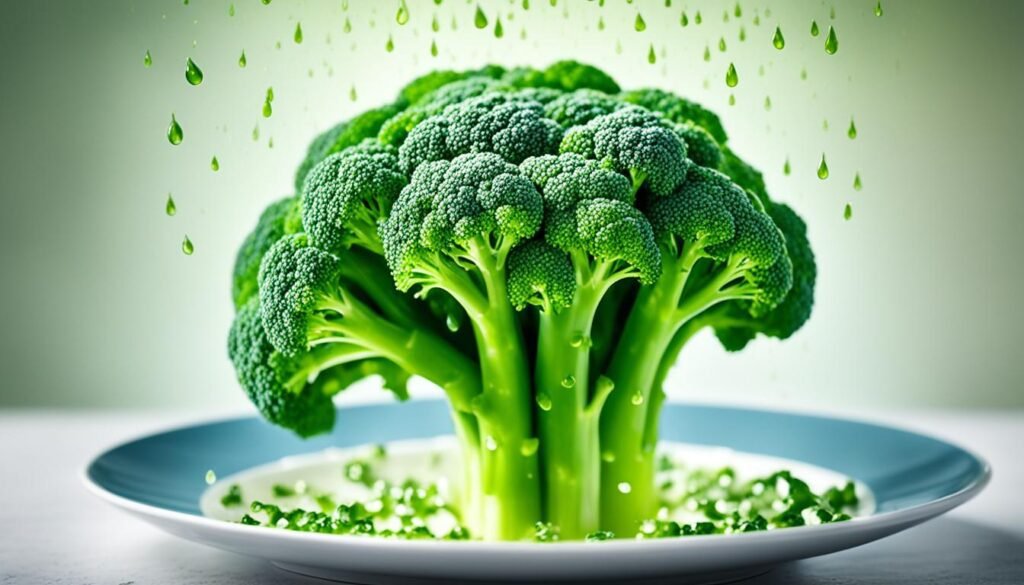
Broccoli is a nutritional powerhouse that offers numerous benefits for skin health. It is rich in fiber, antioxidants, and beta-carotene, which has antioxidant properties. These compounds help protect the skin against UV damage, reduce inflammation, improve blood circulation, and promote elasticity.
In fact, broccoli is one of the best sources of antioxidants among vegetables. Antioxidants play a crucial role in neutralizing free radicals and preventing oxidative stress, which can contribute to premature aging and skin damage. The antioxidants in broccoli help to combat the harmful effects of environmental pollutants and protect the skin from cellular damage.
Did You Know? Broccoli contains more vitamin C than oranges, making it a great choice for supporting collagen production and maintaining skin firmness.
In addition to antioxidants, broccoli is also rich in polyphenols, which have anti-aging properties. Polyphenols help to combat the signs of aging by reducing the appearance of fine lines and wrinkles, promoting skin elasticity, and improving overall skin texture.
Furthermore, beta-carotene, a precursor to vitamin A, is abundant in broccoli. Vitamin A is essential for skin health as it supports cell turnover, helps maintain a youthful appearance, and plays a vital role in the prevention of skin cancer.
A study published in the International Journal of Cancer found that a high intake of vegetables, including broccoli, was associated with a reduced risk of skin cancer. The researchers concluded that the protective effect of vegetables against skin cancer may be due to their rich content of antioxidants and other bioactive compounds.
Antioxidants in Broccoli
The antioxidants found in broccoli, such as vitamin C, vitamin E, and various other phytochemicals, help to protect the skin from oxidative stress caused by environmental factors like pollution and UV radiation. Oxidative stress can lead to premature aging, inflammation, and skin damage.
Research suggests that the antioxidants in broccoli can help prevent collagen breakdown, enhance collagen synthesis, and promote the skin’s natural healing processes. This can result in firmer, more youthful-looking skin.
The high concentration of antioxidants in broccoli also helps to neutralize free radicals in the body. Free radicals are unstable molecules that can damage cells and contribute to the development of various diseases, including skin cancer.
Polyphenols for Anti-Aging
Polyphenols are a type of antioxidant found in abundance in broccoli. These compounds have been shown to have significant anti-aging effects on the skin.
Studies have suggested that polyphenols can help reduce inflammation, improve blood circulation, and enhance cell regeneration in the skin. By doing so, they can help to prevent the formation of wrinkles, sagging skin, and other signs of aging.
One specific polyphenol found in broccoli, called sulforaphane, has been shown to have potent anti-inflammatory and anti-cancer properties. It not only protects the skin from damage but also helps repair damaged DNA and promotes the elimination of harmful toxins from the body, helping to keep the skin healthy and radiant.
Beta-Carotene in Broccoli
Beta-carotene is a carotenoid compound found in green vegetables like broccoli. Once consumed, beta-carotene is converted into vitamin A in the body, which is crucial for maintaining healthy skin.
Vitamin A plays a vital role in the growth and development of skin cells, helps regulate sebum production, and supports the skin’s natural defense mechanisms. By promoting cell turnover and regulating oil production, beta-carotene helps to prevent clogged pores and acne breakouts.
Furthermore, beta-carotene acts as an antioxidant, protecting the skin from harmful free radicals and reducing the risk of skin damage. Studies have shown that beta-carotene supplementation can improve the skin’s elasticity and texture, leading to a more youthful appearance.
Adding broccoli to your diet is a simple and delicious way to boost your skin health. Whether steamed, roasted, or added to stir-fries, this versatile vegetable can be easily incorporated into your meals.
| Nutrient | Amount per 100g |
|---|---|
| Fiber | 2.6g |
| Antioxidants | 1012 µmol TE |
| Polyphenols | 657 mg GAE |
| Beta-Carotene | 3132 µg |
| Vitamin C | 89.2 mg |
Table: Nutritional content of broccoli per 100g
Conclusion
Achieving glowing skin starts from within. A diet rich in the right nutrients can support your skin health and give you a radiant complexion. Incorporating foods like strawberries, kimchi, sunflower seeds, bone broth, organ meats, shellfish, and broccoli into your diet can provide the essential vitamins, minerals, and antioxidants your skin needs.
Remember to stay hydrated and maintain a balanced diet for optimal skin health. By nourishing your body from the inside out, you can unlock the secret to beautiful, glowing skin.
FAQ
What is the best diet for skin glow?
The best diet for skin glow includes a variety of nutrient-rich foods that nourish your skin from the inside out. Incorporating foods like strawberries, kimchi, sunflower seeds, bone broth, organ meats, shellfish, and broccoli can provide the essential vitamins, minerals, and antioxidants your skin needs to maintain a radiant complexion.
How do strawberries benefit skin health?
Strawberries are packed with skin health-promoting nutrients, including vitamin C, anthocyanins, phenolic acids, and flavonoids. Vitamin C protects skin cells from oxidative damage and is necessary for collagen production. Incorporating strawberries into your diet can help improve the health and appearance of your skin.
How does kimchi support gut and skin health?
Kimchi is a fermented dish rich in beneficial bacteria known as probiotics. Consuming foods rich in probiotics and fiber can support both gut and skin health. Kimchi also provides nutrients like provitamin A and vitamin C, which can help promote a healthy gut and improve your skin’s appearance.
What are the benefits of sunflower seeds for skin health?
Sunflower seeds are packed with protein and vitamin E, which play important roles in maintaining skin health. Vitamin E protects skin cells from sun damage, regulates inflammation, and aids in collagen synthesis. Sunflower seeds are also rich in selenium and zinc, essential minerals for healthy skin. Adding sunflower seeds to your diet can nourish your skin and keep it looking youthful.
How does bone broth benefit the skin?
Bone broth is a concentrated source of nutrients that support skin health, including collagen and gelatin. These substances are essential for collagen synthesis and the regeneration of skin cells. Drinking bone broth can provide your skin with the amino acids it needs to repair and regenerate cells, as well as hydrate the skin for a plump and healthy appearance.
How do organ meats benefit skin health?
Organ meats, such as liver and heart, are highly nutritious and beneficial for skin health. They are rich in protein and copper, which protect the skin against free radicals and promote collagen production. Organ meats are also excellent sources of selenium, vitamin A, and zinc, all of which play essential roles in maintaining healthy skin. Including organ meats in your diet can provide your skin with the nutrients it needs to stay glowing and healthy.
What are the benefits of shellfish for skin glow?
Shellfish, such as oysters, clams, and mussels, are packed with nutrients that support skin health. They are rich in minerals like zinc, selenium, and copper, which have antioxidant and anti-inflammatory properties. Shellfish also provide omega-3 fats, which have anti-inflammatory effects and are essential for skin function. Incorporating shellfish into your diet can improve your skin’s appearance and promote a healthy, glowing complexion.
How does broccoli contribute to healthy skin?
Broccoli is a nutritional powerhouse that offers numerous benefits for skin health. It is rich in fiber, antioxidants like polyphenols, and beta-carotene, all of which help protect the skin against UV damage, reduce inflammation, improve blood circulation, and promote elasticity. Adding broccoli to your diet can provide your skin with the essential nutrients it needs to stay healthy and radiant.

